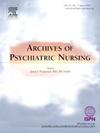Nursing staff attitudes toward family involvement in the care of psychiatric inpatients
IF 2.2
4区 医学
Q1 NURSING
引用次数: 0
Abstract
Background
Historically, families were excluded from psychiatric inpatient care due to misconceptions about their role in illness development. However, contemporary views recognize families as essential support systems that enhance treatment outcomes. Despite this, practical implementation of family involvement remains inconsistent, with many families reporting minimal interaction with nursing staff.
Objectives
This study explored psychiatric nursing staff attitudes toward family involvement in treating hospitalized patients with mental disorders in Israel, a previously unexamined area.
Methods
A qualitative study was conducted using thematic and content analysis for methodological triangulation. Semi-structured interviews were held with 32 psychiatric nurses (20 female, 12 male) from four northern Israeli medical centers. Participants, aged 29–54 (mean = 39.6), had an average of 13.34 years of experience. Interviews, lasting approximately 90 min, followed Braun and Clarke's six-step framework to assess perspectives on family involvement.
Results
Attitudes varied based on personal experience, training, and institutional influences. Resistance was linked to workload concerns and limited awareness of benefits.
Conclusion
Increasing awareness and training on family involvement could enhance its implementation in psychiatric settings, improving patient care and family satisfaction.
护理人员对精神科住院病人家庭参与护理的态度
历史上,由于对家庭在疾病发展中的作用的误解,家庭被排除在精神科住院治疗之外。然而,当代观点认为家庭是提高治疗效果的基本支持系统。尽管如此,家庭参与的实际实施仍然不一致,许多家庭报告与护理人员的互动很少。目的探讨以色列精神科护理人员在治疗精神障碍住院患者时对家庭参与的态度。方法采用专题分析和内容分析相结合的方法进行定性研究。对来自以色列北部四个医疗中心的32名精神科护士(20名女性,12名男性)进行了半结构化访谈。参与者年龄29-54岁(平均39.6岁),平均工作经验为13.34年。访谈持续约90分钟,遵循布劳恩和克拉克的六步框架来评估家庭参与的观点。结果:态度因个人经历、培训和制度影响而异。阻力与工作量问题和对福利的认识有限有关。结论提高对家庭参与的认识和培训,可促进家庭参与在精神科的实施,改善患者护理和家庭满意度。
本文章由计算机程序翻译,如有差异,请以英文原文为准。
求助全文
约1分钟内获得全文
求助全文
来源期刊
CiteScore
3.70
自引率
0.00%
发文量
131
审稿时长
160 days
期刊介绍:
Archives of Psychiatric Nursing disseminates original, peer-reviewed research that is of interest to psychiatric and mental health care nurses. The field is considered in its broadest perspective, including theory, practice and research applications related to all ages, special populations, settings, and interdisciplinary collaborations in both the public and private sectors. Through critical study, expositions, and review of practice, Archives of Psychiatric Nursing is a medium for clinical scholarship to provide theoretical linkages among diverse areas of practice.

 求助内容:
求助内容: 应助结果提醒方式:
应助结果提醒方式:


